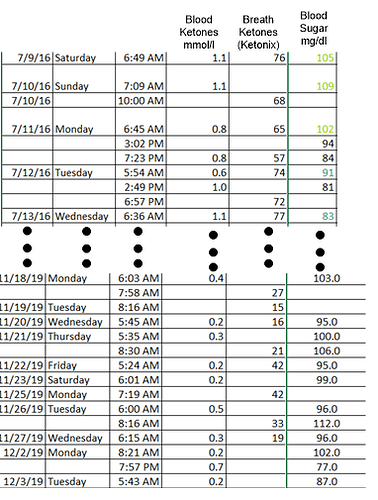That may be the case Paul. Maybe not a serious problem, but a change in physiology related to a stress response, for example. The carnivore diet can result in higher cortisol. That drops the level of nutritional ketosis. So a person eating ketogenic standard with moderated protein and some vegetables may be achieving blood ketone levels of > 0.5mmol/L. That was the nutritional ketosis benchmark set by Dr. Phinney. Has that changed? Maybe it is 0.4mmol/L these days?
With a carnivore dietary approach and cortisol affecting gluconeogenisis that measurable blood ketone number can drop to a trace 0.1mmol/L or 0, despite the very low carbohydrate intake despite low circulating insulin. Higher blood glucose is provided by demand driven GNG and fatty acids (free and those delivered by LDL) are used as fuel by muscles. Other factors like sleep pattern changes and work stress are additional confounders.
I mention the physiological insulin resistance from n=1 observed experiments where fasting blood glucose was higher on the carnivore approach (1).
These aspects conflated can conspire to make a carnivore diet not necessarily a ketogenic diet, as there are factors that can work against keto(ne)genesis.
The other factor I wonder about is if a person has low body fat and is not eating a high fat carnivore diet (3). That may also result in no ketones but higher demand driven gluconeogenisis. My athletic days have passed, I think, so I’m not testing that version.
On keto, there’s also a large emphasis placed on fat. Protein is usually kept under 40% of total calories to prevent gluconeogenesis from knocking you out of ketosis. The carnivore diet encourages high protein and high fat intake as long as you’re getting these calories from animal sources…Unlike keto, there’s no general macronutrient percentage to follow when eating a carnivore diet.(2)
-
https://www.dietdoctor.com/low-carb/fasting-blood-glucose-higher
-
https://www.carbmanager.com/article/what-is-the-carnivore-diet
-
Three years ago some great minds were discussing the reduced blood ketone measurement on the carnivore diet: Confusing results zero carb

